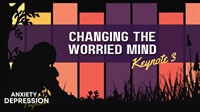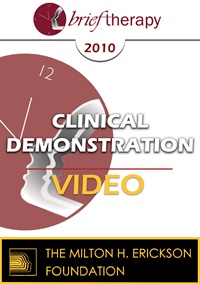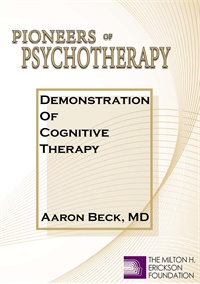
Credit available - Click Here for more information
- Average Rating:
- Not yet rated
- Topic Areas:
- Clinical Demonstrations | Abuse | Addiction | Psychotherapy | Role Play | Cognitive Behavior Therapy (CBT) | Relationships
- Bundle(s):
- Pioneers of Psychotherapy Bundle
- Categories:
- Pioneers of Psychotherapy | Online Continuing Education | Evolution of Psychotherapy | Evolution of Psychotherapy 1995
- Faculty:
- Aaron Beck, MD
- Course Levels:
- Master Degree or Higher in Health-Related Field
- Duration:
- 00:59:00
- Format:
- Audio and Video
- Original Program Date:
- Dec 15, 1995
- Short Description:
- Aaron Beck (1995) selects a clinician to role-play a male client. The client, Mike, was abandoned by his wife after she had multiple affairs. Mike is a recovering alcoholic with a sexually transmitted disease who suffers from dating anxiety, childhood trauma, and feelings of inferiority. Beck demonstrates how to establish a collaborative relationship with the patient.
- Price:
- $59.00 - Base Price
- Average Rating:
- Not yet rated
- Topic Areas:
- Keynotes | Anxiety | Cognitive Behavior Therapy (CBT)
- Categories:
- Anxiety and Depression Conference 2024
- Faculty:
- Reid Wilson, PhD
- Course Levels:
- Master Degree or Higher in Health-Related Field
- Duration:
- 1:00:51
- Format:
- Audio and Video
- Original Program Date:
- Sep 15, 2024
- Short Description:
- This session focuses on treating generalized anxiety disorder through a unifying framework for anxiety disorders. Key concepts include distinguishing “signal” from “noise” worries and breaking the cycle where worry suppresses physical activation. Emphasis is placed on shifting mindset, accepting uncertainty, and using proactive behavioral strategies to reduce anxiety’s hold and build long-term resilience.
- Price:
- $59.00 - Base Price
- Average Rating:
- Not yet rated
- Topic Areas:
- Clinical Demonstrations | Personality Disorders | Brief Therapy | Cognitive Behavior Therapy (CBT) | Therapist Development | Treatment Planning
- Categories:
- Brief Therapy Conference | Brief Therapy Conference 2002
- Faculty:
- Arthur Freeman, EdD
- Course Levels:
- Master Degree or Higher in Health-Related Field
- Duration:
- 59:05
- Format:
- Audio and Video
- Original Program Date:
- Dec 13, 2002
- Short Description:
- Educational Objectives: 1) To describe a structured, directive CBT interview. 2) Given a CBT case, identify a problem and make a treatment plan.
- Price:
-
Sale is $29.00
price reduced from Base Price - $59.00
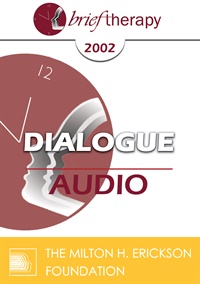
- Average Rating:
- Not yet rated
- Topic Areas:
- Dialogues | Couples Therapy | Cognitive Behavior Therapy (CBT) | Solution Oriented Approach | Communication
- Categories:
- Brief Therapy Conference | Brief Therapy Conference 2002 | Pioneers in Couples and Family Therapy
- Faculty:
- Arthur Freeman, EdD | Michele Weiner-Davis, LCSW
- Duration:
- 1:01:29
- Format:
- Audio Only
- Original Program Date:
- Dec 13, 2002
- Short Description:
- Two brief therapy models—cognitive-behavioral and solution-focused—are explored for their ability to jump-start change in distressed couples. The presenters consider how early signs of improvement, hope-building, and collaborative strategies support movement toward repair. The conversation also addresses clinical judgment around domestic violence, therapist alignment, and working within complex systems.
- Price:
- $15.00 - Base Price

- Average Rating:
- Not yet rated
- Topic Areas:
- Short Courses | Brief Therapy | Cognitive Behavior Therapy (CBT)
- Categories:
- Brief Therapy Conference | Brief Therapy Conference 2002
- Faculty:
- Norma Barretta, PhD | Phillip Barretta, MA, MFT
- Duration:
- 1:19:35
- Format:
- Audio Only
- Original Program Date:
- Dec 12, 2002
- Short Description:
- This short course explores a competency-based approach to brief therapy that targets behavior change through pattern interruption, physiology, and language. Participants learn how posture, movement, imagery, and lateral thinking can quickly shift emotional states, disrupt stuck loops, and open new choices without lengthy analysis of the past. The session offers practical strategies for separating intention from behavior, reframing problems as challenges, and helping clients move from reactivity to proactive self-direction in real-world clinical work.
- Price:
- $15.00 - Base Price
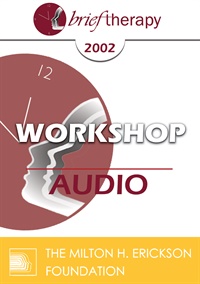
- Average Rating:
- Not yet rated
- Topic Areas:
- Workshops | Cognitive Behavior Therapy (CBT) | Depression | Hypnosis
- Categories:
- Brief Therapy Conference | Brief Therapy Conference 2002
- Faculty:
- Michael Yapko, PhD
- Duration:
- 2:32:28
- Format:
- Audio Only
- Original Program Date:
- Dec 12, 2002
- Short Description:
- In this workshop, Yapko demonstrates how hypnosis can enrich CBT for depression by building expectancy, interrupting rumination, and mobilizing client resources. Through live experiential work, participants see how trance helps clients separate feelings from actions, recognize choices, and envision a future not dictated by the past. The session illustrates hypnosis as a catalyst for resilience, agency, and long-term change.
- Price:
- $15.00 - Base Price
- Average Rating:
- Not yet rated
- Topic Areas:
- Clinical Demonstrations | Brief Therapy | Cognitive Behavior Therapy (CBT) | Couples Therapy
- Categories:
- Brief Therapy Conference | Brief Therapy Conference 2003
- Faculty:
- Frank Dattilio, PhD, ABPP
- Course Levels:
- Master Degree or Higher in Health-Related Field
- Duration:
- 51:51
- Format:
- Audio and Video
- Original Program Date:
- Dec 12, 2003
- Short Description:
- Educational Objectives: 1) To identify maladaptive schemas and dysfunctional thoughts. 2) To describe how to integrate cognitive-behavioral skills into treatment.
- Price:
-
Sale is $29.00
price reduced from Base Price - $59.00
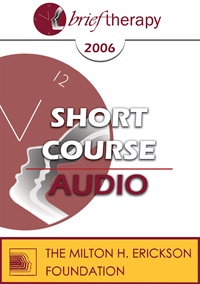
- Average Rating:
- Not yet rated
- Topic Areas:
- Short Courses | Brief Therapy | Psychotherapy | Cognitive Behavior Therapy (CBT) | Voice Therapy
- Categories:
- Brief Therapy Conference | Brief Therapy Conference 2006
- Faculty:
- Lisa Firestone, PhD | Joyce Catlett, MA
- Duration:
- 1:19:30
- Format:
- Audio Only
- Original Program Date:
- Dec 07, 2006
- Short Description:
- This workshop provides mental health professionals with an introduction of Voice Therapy, an innovative cognitive/affective/behavioral technique that facilitates change in psychotherapy. Through lecture, discussion and video tapes, participants will learn how to use voice therapy techniques and exercises to help patients overcome destructive thoughts and behavior in order to make meaningful changes in their lives.
- Price:
- $15.00 - Base Price
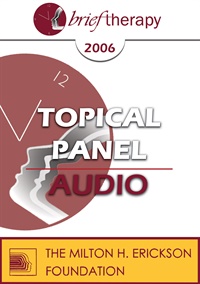
- Average Rating:
- Not yet rated
- Topic Areas:
- Topical Panels | Homework | Therapist Techniques | Cognitive Behavior Therapy (CBT)
- Categories:
- Brief Therapy Conference | Brief Therapy Conference 2006
- Faculty:
- Judith Beck, PhD | Jon Carlson | Reid Wilson, PhD | Michael Yapko, PhD
- Duration:
- 58:15
- Format:
- Audio Only
- Original Program Date:
- Dec 08, 2006
- Short Description:
- This panel explores the vital role of homework in cognitive therapy, highlighting its impact on long-term outcomes and relapse prevention. Strategies include recorded assignments to combat forgetfulness, task setting from Adlerian therapy, and paradoxical techniques for depression. Emphasis is placed on frequent, intense exposure for anxiety and the need to set clear goals, review progress, and tailor homework to each client’s needs for maximum effectiveness.
- Price:
- $15.00 - Base Price
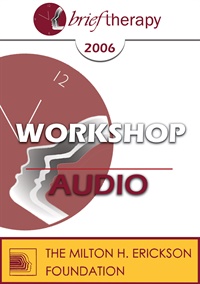
- Average Rating:
- Not yet rated
- Topic Areas:
- Workshops | Cognitive Behavior Therapy (CBT) | Personality Disorders | Brief Therapy | Therapeutic Relationship
- Categories:
- Brief Therapy Conference | Brief Therapy Conference 2006
- Faculty:
- Judith Beck, PhD
- Duration:
- 2:38:42
- Format:
- Audio Only
- Original Program Date:
- Dec 07, 2006
- Short Description:
- "Standard" cognitive therapy often is just not effective enough for clients with personality disorders. Participants will learn how to conceptualize patients and use this conceptualization to plan treatment across sessions and minute-by-minute within sessions. Special attention will be paid to developing the therapeutic alliance, structuring the session, maintaining a problem-solving focus, facilitating homework compliance, and using advanced cognitive and behavioral techniques to help these patients change their deep-seated beliefs at both an intellectual and emotional level.
- Price:
- $15.00 - Base Price
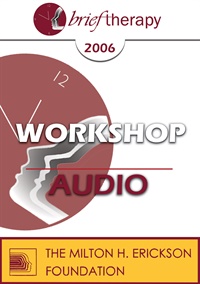
- Average Rating:
- Not yet rated
- Topic Areas:
- Workshops | Brief Therapy | Cognitive Behavior Therapy (CBT) | Couples Therapy
- Categories:
- Brief Therapy Conference | Brief Therapy Conference 2006
- Faculty:
- Frank Dattilio, PhD, ABPP
- Duration:
- 1:55:31
- Format:
- Audio Only
- Original Program Date:
- Dec 09, 2006
- Short Description:
- This workshop focuses on the specific use of cognitive-behavioral strategies as an adjunct to the many treatment modalities of couples therapy. It offers a basic overview of the theories of cognitive-behavioral therapy, particularly as it applies to couples. Participants will learn first-hand techniques and strategies for working with difficult couples and how to integrate these strategies with their respective modes of treatment. The presentation is followed by a videotape showing how to implement techniques.
- Price:
- $15.00 - Base Price
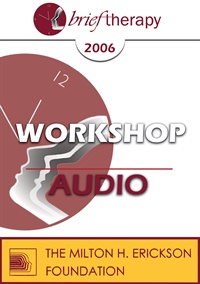
- Average Rating:
- Not yet rated
- Topic Areas:
- Workshops | Brief Therapy | Cognitive Behavior Therapy (CBT) | Family Therapy
- Categories:
- Brief Therapy Conference | Brief Therapy Conference 2006
- Faculty:
- Frank Dattilio, PhD, ABPP
- Duration:
- 2:00:45
- Format:
- Audio Only
- Original Program Date:
- Dec 09, 2006
- Short Description:
- This workshop focuses on the specific use of cognitive-behavioral strategies as an adjunct to the many treatment modalities of family therapy. It offers a basic overview of the theories of cognitive-behavioral therapy, particularly as it applies to families. Participants will learn first-hand techniques and strategies for working with difficult families and how to ingrate these strategies with their respective modes of treatment. Role-playing and case reviews will be used. A question and answer period will follow.
- Price:
- $15.00 - Base Price
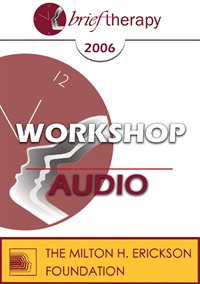
- Average Rating:
- Not yet rated
- Topic Areas:
- Workshops | Cognitive Behavior Therapy (CBT) | Hypnosis
- Categories:
- Brief Therapy Conference | Brief Therapy Conference 2006
- Faculty:
- Michael Yapko, PhD
- Duration:
- 2:39:09
- Format:
- Audio Only
- Original Program Date:
- Dec 10, 2006
- Short Description:
- This session explores how hypnosis enhances cognitive-behavioral therapy by amplifying focus, fostering cognitive flexibility, and reshaping automatic thoughts. Emphasizing experiential learning, the workshop highlights hypnosis as a tool for seeding behavioral activation, building positive expectancy, and helping clients reframe rigid beliefs. Participants gain both a structural model of hypnotic sessions and practical examples of applying hypnosis to depression, anxiety, pain management, and end-of-life care.
- Price:
- $15.00 - Base Price
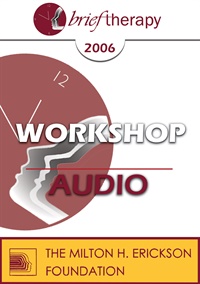
- Average Rating:
- Not yet rated
- Topic Areas:
- Workshops | Hypnosis | Cognitive Behavior Therapy (CBT) | Therapist Development
- Categories:
- Brief Therapy Conference | Brief Therapy Conference 2006
- Faculty:
- Michael Yapko, PhD
- Duration:
- 2:37:17
- Format:
- Audio Only
- Original Program Date:
- Dec 10, 2006
- Short Description:
- This workshop explores the power of expectancy in shaping clinical outcomes and how hypnosis can strengthen it. Participants learn strategies for instilling realistic hope, interrupting negative self-fulfilling prophecies, and fostering future orientation. The session highlights optimism as a therapeutic tool, showing how therapists can help clients believe in change and commit to the process.
- Price:
- $15.00 - Base Price
- Average Rating:
- Not yet rated
- Topic Areas:
- Clinical Demonstrations | Cognitive Behavior Therapy (CBT) | Eating Disorders | Weight Loss
- Categories:
- Brief Therapy Conference | Brief Therapy Conference 2008
- Faculty:
- Judith Beck, PhD
- Course Levels:
- Master Degree or Higher in Health-Related Field
- Duration:
- 56:42
- Format:
- Audio and Video
- Original Program Date:
- Dec 13, 2008
- Short Description:
- BT08 Clinical Demonstration 10 - Cognitive Behavioral Approach to Weight Loss - Judith Beck, PhD
- Price:
-
Sale is $29.00
price reduced from Base Price - $59.00

- Average Rating:
- Not yet rated
- Topic Areas:
- Short Courses | Brief Therapy | Children and Adolescent Therapy | Cognitive Behavior Therapy (CBT) | Ericksonian Hypnosis and Therapy Techniques
- Categories:
- Brief Therapy Conference | Brief Therapy Conference 2008
- Faculty:
- Joseph Sestito, MSSA, LISW-S
- Duration:
- 1:28:27
- Format:
- Audio Only
- Original Program Date:
- Dec 11, 2008
- Short Description:
- In this workshop, you will learn about brief Ericksonian and CBT solutions for children, adolescents and the troubled child in you. I have pioneered these over the last decade during which I have done this type of therapy with children and adolescents on a full-time basis, and trained other clinicians working with this population. There are essentially two methods within each session that you conduct with your child or adolescent client which you will learn to do. These can bring back and begin to use immediately in your practice following this conference.
- Price:
- $15.00 - Base Price
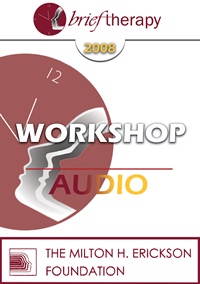
- Average Rating:
- Not yet rated
- Topic Areas:
- Workshops | Panic | Cognitive Behavior Therapy (CBT) | Anxiety
- Categories:
- Brief Therapy Conference | Brief Therapy Conference 2008
- Faculty:
- Reid Wilson, PhD
- Duration:
- 2:46:05
- Format:
- Audio Only
- Original Program Date:
- Dec 11, 2008
- Short Description:
- This treatment method teaches clients to actively engage with symptoms through interoceptive exposure, like hyperventilating or breathing through a straw. Emphasis is placed on reducing safety behaviors, using self-talk, point systems, and repeated practice to build resilience and shift fear responses.
- Price:
- $15.00 - Base Price
- Average Rating:
- Not yet rated
- Topic Areas:
- Clinical Demonstrations | Cognitive Behavior Therapy (CBT) | Storytelling | Constructive Narrative | Psychotherapy | Brief Therapy
- Categories:
- Brief Therapy Conference | Brief Therapy Conference 2010
- Faculty:
- Donald Meichenbaum, PhD
- Course Levels:
- Master Degree or Higher in Health-Related Field
- Duration:
- 56:53
- Format:
- Audio and Video
- Original Program Date:
- Dec 11, 2010
- Short Description:
- This presentation will demonstrate the heuristic value of using a Case Conceptualization Model to inform assessment and treatment decision- making ; the "art of Socratic questioning; a strength-based treatment approach and ways to implement the Core Tasks of psychotherapy. A Constructive Narrative treatment approach that focuses on the nature of the client's "story-telling" features will be highlighted.
- Price:
-
Sale is $29.00
price reduced from Base Price - $59.00
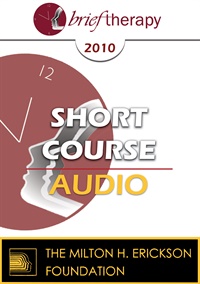
- Average Rating:
- Not yet rated
- Topic Areas:
- Animal Assisted Therapy | Cognitive Behavior Therapy (CBT) | Short Courses | Psychotherapy | Brief Therapy
- Categories:
- Brief Therapy Conference | Brief Therapy Conference 2010
- Faculty:
- Dale Klein-Kennedy, LPCC
- Duration:
- 57:15
- Format:
- Audio Only
- Original Program Date:
- Dec 09, 2010
- Short Description:
- This workshop will explore the human-animal bond and its history and will define and describe the use of Animal-Assisted Therapy (AAT) and Equine-Assisted Psychotherapy (EAP in working with domestic violence survivors, child-witnesses, families, children at risk and populations not benefiting from traditional therapies. In addition to the information presented about this brief therapy, participants will have the opportunity to view a video of AAT and EAP sessions. With Dale Klein-Kennedy.
- Price:
- $15.00 - Base Price
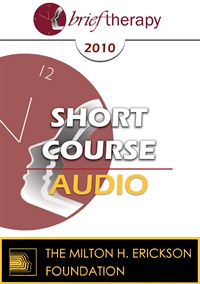
- Average Rating:
- Not yet rated
- Topic Areas:
- Cognitive Behavior Therapy (CBT) | Depression | Short Courses | Mindfulness | Attention Deficit Disorder (ADD)
- Categories:
- Brief Therapy Conference | Brief Therapy Conference 2010
- Faculty:
- Joseph Sestito, MSSA, LISW-S
- Duration:
- 1:29:31
- Format:
- Audio Only
- Original Program Date:
- Dec 09, 2010
- Short Description:
- The basics about mindfulness and cognitive-behavioral therapy will be explained, along with the research findings which show that aerobic exercise helps both ADD and depression through improving brain functioning. Participants will become acquainted with ten mindfulness skills, four CBT methods and five types of aerobic exercise which can help their clients. Participants will see how they can be the instruments who help their clients deliver themselves from distraction to distinction. With Joseph Sestito.
- Price:
- $15.00 - Base Price
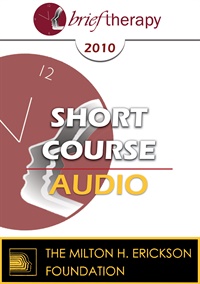
- Average Rating:
- Not yet rated
- Topic Areas:
- Cognitive Behavior Therapy (CBT) | Psychotherapy | Short Courses | Humor | Brief Therapy
- Categories:
- Brief Therapy Conference | Brief Therapy Conference 2010
- Faculty:
- Steve Sultanoff | Steven Sultanoff, Psychologist
- Duration:
- 1:26:25
- Format:
- Audio Only
- Original Program Date:
- Dec 09, 2010
- Short Description:
- Humor in the serious realm of psychotherapy? This lively presentation, filled with anecdotes and clinical illustrations, will explore the rationale for and practical application of humor in cognitive therapy. Both cognitive therapy and humor can create change in the central aspects of human experience—cognitions, emotions, behaviors, and physiology. The presenter will explore how humor can be a powerful tool for both diagnosis and treatment, and will differentiate between empathic and hostile styles of humor. With Steven Sultanoff.
- Price:
- $15.00 - Base Price
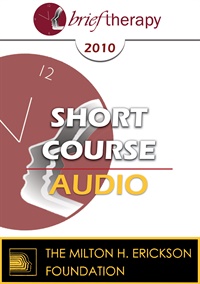
- Average Rating:
- Not yet rated
- Topic Areas:
- Hypnosis | Short Courses | Brief Therapy | Cognitive Behavior Therapy (CBT)
- Categories:
- Brief Therapy Conference | Brief Therapy Conference 2010
- Faculty:
- Assen Alladin, PhD
- Duration:
- 1:31:40
- Format:
- Audio Only
- Original Program Date:
- Dec 09, 2010
- Short Description:
- This course dives into how hypnosis can sharpen CBT’s impact by calming somatic distress, interrupting rumination, and accessing deeper cognitive layers that often sustain anxiety or depression. Through demonstration and clinical examples, it offers practical ways to shift entrenched patterns, build positive expectancy, and strengthen long-term relapse prevention.
- Price:
- $15.00 - Base Price
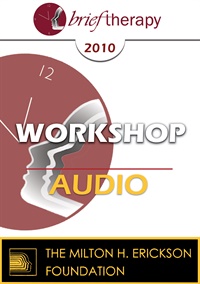
- Average Rating:
- Not yet rated
- Topic Areas:
- Cognitive Behavior Therapy (CBT) | Family Therapy | Workshops
- Categories:
- Brief Therapy Conference | Brief Therapy Conference 2010
- Faculty:
- Frank Dattilio, PhD, ABPP
- Duration:
- 1:44:27
- Format:
- Audio Only
- Original Program Date:
- Dec 09, 2010
- Short Description:
- BT10 Workshop 10 - Cognitive-Behavioral Techniques with Families - Frank M. Dattilio, PhD, ABPP This workshop focuses on the specific use of cognitive-behavioral strategies as an adjunct to the many treatment modalities of family therapy. It offers a basic overview of the theories of cognitive-behavioral therapy, particularly as it applies to families. Participants will learn first-hand techniques and strategies for working with difficult families and how to integrate these strategies with their respective modes of treatment. The presentation is followed by a videotape that demonstrates the implementation of techniques and interventions.
- Price:
- $15.00 - Base Price
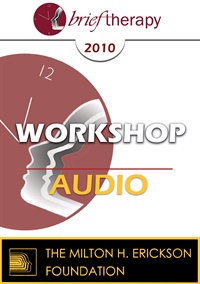
- Average Rating:
- Not yet rated
- Topic Areas:
- Anxiety | Workshops | Cognitive Behavior Therapy (CBT) | Obsessive Compulsive Disorder (OCD) | Panic
- Categories:
- Brief Therapy Conference | Brief Therapy Conference 2010
- Faculty:
- Reid Wilson, PhD
- Duration:
- 2:25:44
- Format:
- Audio Only
- Original Program Date:
- Dec 10, 2010
- Short Description:
- Wilson presents a strategic approach to treating anxiety disorders including panic, social anxiety, phobias, and OCD. Moving beyond traditional CBT, he introduces provocative techniques that reframe fear, welcome uncertainty, and promote active exposure. Through paradox, cognitive shifts, and interoceptive exercises, clients are guided to face anxiety head-on. Case studies and practical tools, like scoring exposure points and turning practice into a game, illustrate how frequent, intense exposure leads to lasting change.
- Price:
- $15.00 - Base Price
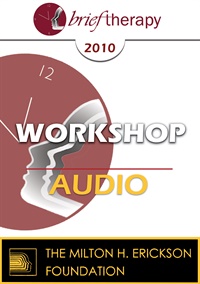
- Average Rating:
- Not yet rated
- Topic Areas:
- Cognitive Behavior Therapy (CBT) | Couples Therapy | Workshops
- Categories:
- Brief Therapy Conference | Brief Therapy Conference 2010
- Faculty:
- Frank Dattilio, PhD, ABPP
- Duration:
- 2:02:42
- Format:
- Audio Only
- Original Program Date:
- Dec 12, 2010
- Short Description:
- BT10 Workshop 40 - Cognitive-Behavioral Techniques with Couples - Frank M. Dattilio, PhD, ABPP This workshop focuses on the specific use of cognitive-behavioral strategies as an adjunct to the many treatment modalities of couples therapy. It offers a basic overview of the theories of cognitive-behavioral therapy, particularly as it applies to couples. Participants will learn first-hand techniques and strategies for working with difficult couples and how to integrate these strategies with their respective modes of treatment. The presentation is followed by a videotape that demonstrates the implementation of techniques and interventions.
- Price:
- $15.00 - Base Price


